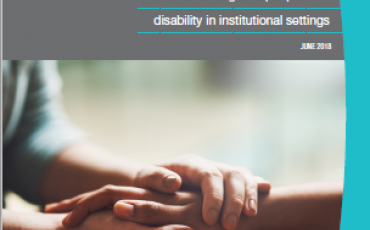Equal Before the Law

Towards Disability Justice Strategies
February 2014
Foreword
Equality Before The Law is a basic tenet of human rights. But I have learned, both as an advocate and during my time as Australia's Disability Discrimination Commissioner, that equality is not always available for Australians with disabilities in the criminal justice system.
This report provides a snapshot of where that equality does not exist, highlights services and programs that improve equality before the law for people with disabilities, and sets some directions by which change may occur.
We conducted Australia-wide consultations with people with disabilities, and practitioners throughout the justice system - from Attorneys-General, judges and magistrates; to lawyers, corrections officers and community workers. We heard some tragic stories of where the criminal justice system had failed people with disabilities, and had compounded disadvantage. We saw some positive examples of where best practise was occurring. And we have tried - in this report - to begin the work necessary to develop strategies for change.
I appreciate that criminal justice is primarily the province of States and Territories. For this reason, this report does not take the usual course of making recommendations. Rather, it seeks to point out the barriers, highlight services and programs, and propose possible actions towards the development of Disability Justice Strategies. I trust that this approach will be of benefit to State, Territory and Commonwealth administrations in their ongoing work.
The case for change is strong. Not only should Australians with disabilities - whether victims of crime, offenders, or participants in the criminal justice system - experience equal treatment before the law. But considerable economic savings can be made by preventing violence and providing early diversion and support.
I thank all of the Australians with disabilities, and their families and carers, who met with us and made submissions. I also thank disability advocacy organisations, service providers in the justice sector and government representatives who participated. I thank the Attorneys-General who met with me, and demonstrated their commitment to improvement in this area. I trust that this report provides a solid foundation for change.
Finally, may I thank Commission staff and contractors, the pro bono support of DLA Piper, and our partners at University of NSW and Price Waterhouse Coopers who made this report possible.
The criminal justice system in Australia is complex. Equal treatment by it, irrespective of difference, is fundamental. I trust that this report will begin the work of redressing inequality experienced by Australians with disabilities, particularly those with complex support needs or communication challenges.
Graeme Innes AM
Disability Discrimination Commissioner
February 2014



